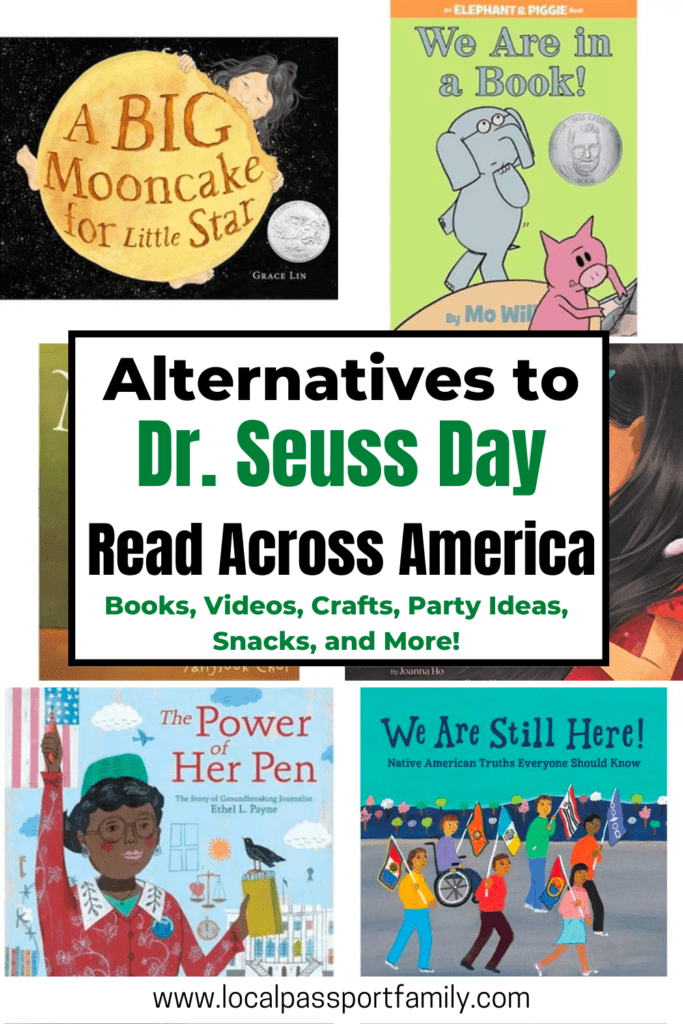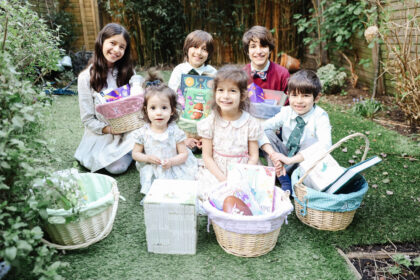Growing up, I remember reading a few Dr. Seuss books in school, but they were never really pedestalized. When I was in middle school, though, Read Across America day was launched, falling on Dr. Seuss’s birthday and commonly being dubbed “Dr. Seuss Day.”
Soon after my own children started elementary school and started celebrating special reading days, much more information started to emerge about the racism within Dr. Seuss’s work. Like many, I was shocked and disappointed, and upset that I myself hadn’t noticed sooner. I was grateful that the National Education Association, the sponsor of the week, began to refocus on Read Across America Day & Week instead of on highlighting Dr. Seuss.
(If you’d like more information on the racism within Seuss’s works, you can find more info here, here, here, and also here.)

What Read Across America Looks Like Now
The NEA has since expanded their program to heavily focus on a whole year of reading inclusive children’s literature. In fact, their website states, “Let’s read and grow together with 12 months of recommended books, authors, and teaching resources that promote diversity and inclusion.”
While I believe Dr. Seuss should continue to be discussed for the books’ problematic aspects, and to encourage critical thinking and discernment, I don’t think it should be the focus of a week highlighting the joys of reading. I love the change in focus to highlight many Americans’ contributions to the beautiful and varied world of children’s literature!
Thinking about some of those problematic aspects can also be tricky depending on the age range. While young children can and should hear age-appropriate discussions on racism and antiracism, it can be difficult to discern some of the harm without an instructor leading active education and discussion.
Discussing With Your Child’s Teacher + Sample Teacher Letter
Of course, not all schools and classrooms have yet responded to this change. Some continue to hold onto past traditions of centering Seuss for a day or a week, without any inclusion of the problematic aspects of his books. And many are unaware of recent information! In these cases, I’ve found almost all teachers anxious to create more inclusive, safe classrooms free of harm to all students.
I’ve created a list of alternatives to Dr. Seuss Week below to support teachers in creating a magical Read Across America Week that is safe for all students. I’ve also put together the below sample letter if you’d like to reach out to your own child’s teacher or school administrator. I hope it’s helpful as you advocate for educational safety and inclusion for all children!
Alternatives To Dr. Seuss Day & Dr. Seuss Week
While the NEA itself has provided a number of wonderful resources, here are some additional supplementary activities that teachers may find useful to use in place of Dr. Seuss activities.
1. Read Diverse Picture Books
Picture books are a wonderful way to introduce new characters, settings, and concepts. They’re even great for older elementary children to hear and to launch a deeper discussion. There are a plethora of fantastic picture books representing a variety of backgrounds.
Here are some terrific book lists:
- NEA Monthly Reading Calendar
- Themed Read Across America week book list from The Tutu Teacher
- A-Z Global Children’s Book Club: 26 picture books from 26 countries around the world
- Black History Month Picture Books (with a free printable!)
- AAPI Picture Books
2. Read Books With Rhyming & Alliteration
Dr. Seuss is famous for his catchy rhymes that are appealing to young readers. But there are plenty of other books out there that do exactly the same, minus the harm.
Here are some fantastic alternatives to Seuss books (and more here) for their rhyming, alliteration, focus on colors & numbers, letters, and more!
3. Have A Daily Inclusion Theme
In the past, many schools created daily themes around Seuss – Cat in the Hat day, Horton Hears A Who day, etc. Why not create themes centered around inclusion instead?
Here are some ideas for book themes, along with book lists to support them:
- BIPOC protagonists & BIPOC joy (Juneteenth picture books)
- Women (Picture books about women leaders)
- Disability (Picture books with disabled characters)
- Government (Voting & elections picture books)
- Indigenous peoples (Inclusive Thanksgiving books for kids)
- Family makeup (Inclusive kids’ books about love)
- Immigrants and refugees (Multicultural picture books about immigration)
- Religion (60+ kids books about world religions)
- Creativity (Kids’ art books from around the world)
4. Dress Up As A Favorite Book Character
Instead of having a special visit from The Cat In The Hat, why not have a visit from another favorite book character? In fact, why not invite students to join in the fun by dressing as their own favorite book character for the day? Here’s a list of some fantastic book-inspired costumes.
5. Celebrate Grace Lin Day
If you’d like to celebrate a specific author who has hugely impacted children’s books, Grace Lin is a fantastic option instead of Seuss. She was recently awarded the Children’s Literature Legacy Award by the American Library Association for her “significant and lasting contribution to literature for children.”
Grace has created an enormous number of resources, including activities, crafts, read alouds, and more, so it’s easy to have a day highlighting her! Here are some of my favorite ideas:
- Read this biography of Grace Lin
- Learn to draw a Chinese dragon with her
- Listen to her read aloud a chapter of Where the Mountain Meets the Moon
- Read the picture book A Big Mooncake for Little Star and do a reader’s theater. You can also nibble the phases of the moon!
- Read Fortune Cookie Fortunes and write your own fortunes
6. Read A Book About A Book
There are few more iconic children’s authors than Mo Willems, and We Are In A Book! is one a personal favorite. Elephant and Piggie are delighted at being read, and students will be equally delighted to read them. Available on Amazon, Bookshop, Target, Walmart.
After reading the book, doodle along to some music while watching the short and very delightful Yo-Yo Mo Show.
7. Read A Picture Book Biography About An Author
Who better to highlight during a week focused on reading than authors themselves? Since class time during the week likely won’t permit reading a full lengthy biography, here are a few wonderful picture book biographies of some incredible authors:
- Planting Stories: The Life of Librarian and Storyteller Pura Belpré by Anika Aldamuy Denise (Author), Paola Escobar (Illustrator)
- The Power of Her Pen: The Story of Groundbreaking Journalist Ethel L. Payne by Lesa Cline-Ransome (Author), John Parra (Illustrator)
- John Ronald’s Dragons: The Story of J. R. R. Tolkien by Caroline McAlister (Author), Eliza Wheeler (Illustrator)
- She Made a Monster: How Mary Shelley Created Frankenstein by Lynn Fulton (Author), Felicita Sala (Illustrator)Available on Amazon, Bookshop, Target, Walmart
8. Write Personal Biographies
In addition to celebrating other authors, Read Across America week is a wonderful opportunity to celebrate budding authors in your own classroom. Students can take time to write their own biographies, about a beloved relative, about their favorite genre of reading or writing, or anything else connected to their experience with appreciating literature.
9. Book An Author or Illustrator Visit, Either In Person or Virtual
There are few things more exciting than chatting with a real live author or illustrator of a book kids love! Virtual visits are usually easy to book and inexpensive. Most authors/illustrators have a link on their websites to schedule one easily!
Here are some favorites who do visits:
- Grace Lin
- Joanna Ho
- Amy Webb
- Andrea Wang
- Carole Lindstrom
- Michaela Goade
- Kwame Alexander
- Rajani LaRocca
- Erin Entrada Kelly
- Meg Medina
10. Read with Book Buddies
Many children love to read while snuggled up. Invite them to bring in a special stuffed animal or blanket one day to join in on the reading fun.
Another fun option is to connect older and younger classrooms. Younger children can pair up with an older reading buddy, who can read aloud a picture book to them. Wonderful for younger ones to hear more reading, and perfect for older students to practice their read aloud skills. You could even invite each student to bring in a special book from home!
11. Do A Book-Themed Learning Activity
There are thousands of fantastic book-themed activities out there, but here are some of my favorites, along with their accompanying picture books to read aloud:
- The Name Jar: create a giant classroom name jar out of construction paper (have each student write their name), and do a writing prompt or story map
- Dragons Love Tacos: lessons on word work or cause & effect
- Eyes That Kiss in the Corners: have each student write down descriptive words about their eyes, and draw what they look like
12. Have Picture Book-Inspired Snacks
While many schools are still holding back on food prep due to the current health environment, if yours is able, you may want to consider some book-inspired snacks. Instead of eating green eggs and ham, why not consider a Very Hungry Caterpillar fruit spread or some bread with jam like Frances? Here are some more book-themed snack ideas.
13. Watch A Book-Inspired Movie
Instead of The Grinch, consider something like the movie adaptation of Ferdinand!
Just writing all these gets me so wonderfully excited about a whole week to specifically focus on the joy of reading and books. It’s so exciting to celebrate authors and readers and wonderful and connective children’s literature. And there are truly SO many ways to do it without falling back on texts and images built on racist stereotypes.
I hope these alternatives to Dr. Seuss are helpful to you as you work to make your schools and communities more safe, welcoming, and inclusive of all students!











[…] our bookshelves. (Here are 10 ideas for what to do with your Dr. Seuss books. Also, here are some Alternatives to Dr. Seuss Day if your school is celebrating Read Across America Week, along with a sample letter to reach out to […]
[…] Day (whose books often stereotype Asian characters) still important, and could you share other Read Across America resources? Is your school administration and parent/teacher board representative of a variety of perspectives […]
[…] Alternatives to Dr. Seuss Day […]